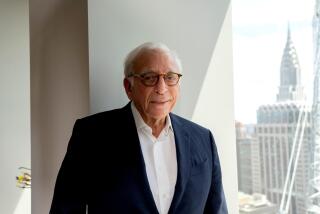Spiegel Played High-Risk Game in Thrift Industry : S&Ls;: Columbia Savings’ top executive, who has announced his resignation, was considered more an entrepreneur than a typical thrift chief.
- Share via
Columbia Savings Chairman and Chief Executive Thomas Spiegel never tried to be a traditional thrift executive. He rarely spoke of the thrift industry’s mandate to make home ownership possible, or of industrywide problems such as interest rate risk.
Instead Spiegel became an advocate of risky, high-yield junk bonds and a protege of indicted Beverly Hills trader Michael Milken.
In the process, he also was labeled as a maverick, dangerous for both the risks that his association posed to the thrift industry’s insurance fund, and the scrutiny that he brought to the once quiet and stodgy business. Thrift industry executives hope that his decision to abandon Columbia’s helm and operate a junk bond company will end an era of controversy at one of the nation’s largest savings and loans.
Spiegel was not available for comment Monday.
“I never saw him as part of the savings and loan business as I grew up in it,” said Norman Coulson, chief executive of GlenFed Inc., the parent of Glendale Federal Bank. “We saw him as a very bright entrepreneur but doing a very different kind of thing than we are doing here.”
Added another S&L; president who asked not to be identified: “I like Tom. But with all the flap in Congress about the risk taking the industry has been involved with, we don’t need the kind of attention Columbia brings. “
Although Spiegel never seemed to seek attention, it followed him from the moment that he took the helm of his father’s Beverly Hills-based thrift in 1977.
Spiegel, the son of a Czechoslovakian immigrant, was barely 31 years old when he joined Columbia, which had been controlled by his father, Abraham, since 1974.
He had no experience in the savings and loan business, but three years after Abraham Spiegel bought 34% of Eastland Savings & Loan Assn.--later renamed Columbia Savings--Tom was named president.
It wasn’t long before Columbia became buffetted by a classic industry problem of lending out money for less than it cost to obtain it. The problem was endemic because thrifts were required to invest the majority of their funds in long-term, fixed rate mortgages, while their source of funds were short-term deposits.
Spiegel has said he faced the very real possibility that Columbia would fail if he was unable to make sweeping changes at the thrift in a hurry. He realized that it took Citicorp three days to clear Columbia checks, so Spiegel decided to use the “float time” to his advantage by investing the money during that period. Citicorp’s conservative chairman halted the dubious practice.
Shortly thereafter, he became enamored with Milken, who was starting Drexel Burnham Lambert’s fledgling junk bond operations on the West Coast. Within a few years, Columbia became one of the nation’s biggest investors in the risky, high-yield securities.
Columbia prospered, at one time ranking as the nation’s most profitable thrift.
Spiegel also prospered, earning a whopping $9-million salary in 1985--the highest annual paycheck in the industry’s history.
Again, federal regulators were incensed. Calling the payment “unreasonable,” they demanded that Spiegel give back some of the money. After fighting over the issue for nearly two years, the regulators relented and allowed Spiegel to keep the payment. But they required that his future salary be reviewed by outside experts to ensure that it was not excessive.
Although his salary dropped precipitously after 1985, he continued to be the industry’s best-paid executive, earning cash compensation of $3.75 million in 1988--not to mention more than $325,000 worth of company-paid perks such as supplemental life insurance and the use of cars, planes and vacation homes, as well as accounting and legal services.
Meanwhile, securities regulators and the U.S. Department of Justice began to target Milken in the massive insider trading scandal that has rocked Wall Street. Spiegel, who has become one of Milken’s closest friends and business associates, also became wrapped up in the investigation, although neither he nor the thrift have been charged with wrongdoing.
And more recently, Spiegel has been caught up in political contribution scandals surrounding Los Angeles Mayor Tom Bradley and former U.S. Rep. Tony Coelho. Columbia helped both politicians purchase high-yield securities that were not readily available to the public. However, Spiegel’s supporters contend that his problems stem primarily from his being involved in a highly regulated industry.
THE S&L;’S GROWING JUNK BOND PROBLEMS Chart shows Columbia’s unrealized losses on its high-yield portfolio, about 90% of which is in junk bonds and the rest in preferred stock.
COLUMBIA’S FALLING EARNINGS 9 mos. ended Sept. 30: $212-million loss
COLUMBIA SAVINGS STOCK (Weekly closing price per share) Monday close: $2.75, down 0.375 cents Source: Dow Jones Historical Stock Quote Reporter Service
RELATED STORY, A1
More to Read
Inside the business of entertainment
The Wide Shot brings you news, analysis and insights on everything from streaming wars to production — and what it all means for the future.
You may occasionally receive promotional content from the Los Angeles Times.










